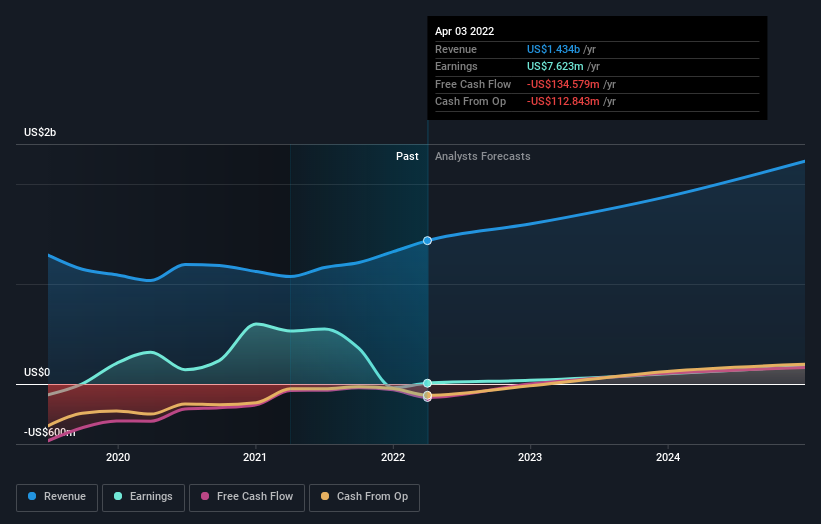SunPower (NASDAQ:SPWR) shareholders are still up 184% over 5 years despite pulling back 3.2% in the past week
It hasn't been the best quarter for SunPower Corporation (NASDAQ:SPWR) shareholders, since the share price has fallen 17% in that time. But that doesn't change the fact that the returns over the last five years have been pleasing. It has returned a market beating 86% in that time. While the long term returns are impressive, we do have some sympathy for those who bought more recently, given the 37% drop, in the last year.
While the stock has fallen 3.2% this week, it's worth focusing on the longer term and seeing if the stocks historical returns have been driven by the underlying fundamentals.
See our latest analysis for SunPower
While SunPower made a small profit, in the last year, we think that the market is probably more focussed on the top line growth at the moment. As a general rule, we think this kind of company is more comparable to loss-making stocks, since the actual profit is so low. For shareholders to have confidence a company will grow profits significantly, it must grow revenue.
Over the last half decade SunPower's revenue has actually been trending down at about 16% per year. Even though revenue hasn't increased, the stock actually gained 13%, per year, during the same period. It's probably worth checking other factors such as the profitability, to try to understand the share price action. It may not be reflecting the revenue.
The graphic below depicts how earnings and revenue have changed over time (unveil the exact values by clicking on the image).
SunPower is well known by investors, and plenty of clever analysts have tried to predict the future profit levels. You can see what analysts are predicting for SunPower in this interactive graph of future profit estimates.
What about the Total Shareholder Return (TSR)?
Investors should note that there's a difference between SunPower's total shareholder return (TSR) and its share price change, which we've covered above. The TSR is a return calculation that accounts for the value of cash dividends (assuming that any dividend received was reinvested) and the calculated value of any discounted capital raisings and spin-offs. We note that SunPower's TSR, at 184% is higher than its share price return of 86%. When you consider it hasn't been paying a dividend, this data suggests shareholders have benefitted from a spin-off, or had the opportunity to acquire attractively priced shares in a discounted capital raising.
A Different Perspective
We regret to report that SunPower shareholders are down 37% for the year. Unfortunately, that's worse than the broader market decline of 17%. However, it could simply be that the share price has been impacted by broader market jitters. It might be worth keeping an eye on the fundamentals, in case there's a good opportunity. On the bright side, long term shareholders have made money, with a gain of 23% per year over half a decade. It could be that the recent sell-off is an opportunity, so it may be worth checking the fundamental data for signs of a long term growth trend. While it is well worth considering the different impacts that market conditions can have on the share price, there are other factors that are even more important. Like risks, for instance. Every company has them, and we've spotted 3 warning signs for SunPower (of which 1 is a bit concerning!) you should know about.
If you like to buy stocks alongside management, then you might just love this free list of companies. (Hint: insiders have been buying them).
Please note, the market returns quoted in this article reflect the market weighted average returns of stocks that currently trade on US exchanges.
Have feedback on this article? Concerned about the content? Get in touch with us directly. Alternatively, email editorial-team (at) simplywallst.com.
This article by Simply Wall St is general in nature. We provide commentary based on historical data and analyst forecasts only using an unbiased methodology and our articles are not intended to be financial advice. It does not constitute a recommendation to buy or sell any stock, and does not take account of your objectives, or your financial situation. We aim to bring you long-term focused analysis driven by fundamental data. Note that our analysis may not factor in the latest price-sensitive company announcements or qualitative material. Simply Wall St has no position in any stocks mentioned.


